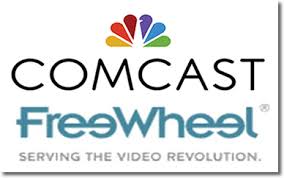What: Comcast Corporation completed the purchase of online video ad serving vendor FreeWheel yesterday for a reported US $350 million.
Why it matters: According to an analyst at Frost & Sullivan, the move reinforces two major trends in the industry. The first is for cable operators to get more into content ownership to retain their negotiating edge over content providers (the Comcast-NBC deal in 2011 being the best example). The second is the shift to multiscreen digital content delivery, largely monetized by targeted advertising. Comcast aims to deliver its content across several platforms – including traditional TVs, smartphones, tablets and other handheld devices – and the purchase of FreeWheel enables it to place targeted / addressable ads for both live and on-demand content.
 Comcast has wrapped up its deal to buy FreeWheel, the Web video ad-serving company.The cable giant will end up paying US $360 million for the seven-year-old startup. FreeWheel helps Web companies deliver video ads, and has specialized in locking up deals with big media companies like Viacom, Fox and Comcast’s NBCUniversal. FreeWheel had raised more than US $30 million, and last year it booked US $22 million in revenue, according to a person familiar with the company. The plan is for FreeWheel to run as a standalone company within Comcast, similar to the way video software company the Platform has operated since Comcast bought that startup in 2006. All of FreeWheel’s employees, including CEO Doug Knopper and his two co-founders, are expected to stay with the company.
Comcast has wrapped up its deal to buy FreeWheel, the Web video ad-serving company.The cable giant will end up paying US $360 million for the seven-year-old startup. FreeWheel helps Web companies deliver video ads, and has specialized in locking up deals with big media companies like Viacom, Fox and Comcast’s NBCUniversal. FreeWheel had raised more than US $30 million, and last year it booked US $22 million in revenue, according to a person familiar with the company. The plan is for FreeWheel to run as a standalone company within Comcast, similar to the way video software company the Platform has operated since Comcast bought that startup in 2006. All of FreeWheel’s employees, including CEO Doug Knopper and his two co-founders, are expected to stay with the company.
According to Aravindh Vanchesan, a Digital Media Research Program Manager, at Frost & Sullivan in Mountain View, CA, the acquisition of Freewheel by Comcast opens major concerns from a competitor as well as consumer perspective. “For starters, Comcast’s fierce pay-TV competitors – DirecTV and Dish Network – are both FreeWheel clients currently. Further, there have been persistent allegations over the years about Comcast ‘throttling’ video traffic from specific sites like Netflix or YouTube. In fact, Netflix’s recent deal with the cable company to increase streaming speed and quality by delivering content directly through its network brought up the familiar Net Neutrality debate again.”
Is Comcast developing its own YouTube alternative?
Vanchesan adds that in “recent years, media owners are distributing more and more original programming online as they can charge higher CPMs (relative to display ads/print ads) from advertisers.” “This is a vital supplement to their declining TV ad revenue streams. There have also been clear indications that Comcast is developing its own YouTube alternative (or YouTube ‘killer,’ if you will). The company is allegedly working closely with online video content creators to distribute their original programming through its set-top-boxes. The offerings are expected to be largely short-form content similar to YouTube in addition to live and on-demand material. The key value propositions to content owners would be the higher percentage of ad revenue they can expect in addition to content licensing fees. In this context, the FreeWheel buyout assumes greater significance as it makes more business sense for Comcast to own its top-of-the-line ad serving technology if it is jumping into the online video space with a big splash.””
Please attribute Frost & Sullivan as based (or headquartered) in Mountain View, Calif. Frost & Sullivan is the Growth Partnership Company that provides market research and consultative services to a wide range of industries, among other offerings.
[ctahfb]







